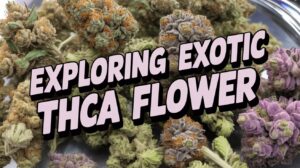The topic of Tetrahydrocannabinolic acid (THCa) legality presents a complex landscape, mired with intricate federal and state regulations that require thoughtful examination.
While THCa, a naturally occurring non-psychoactive compound in the cannabis plant, transforms into the psychoactive Tetrahydrocannabinol (THC) upon heating, its legal status remains distinct.
The convoluted nature of the laws, which often entails distinguishing legal hemp from controlled marijuana based on THC concentration as per the 2018 Farm Bill, further complicates matters.
This complexity is further magnified when we factor in the variations in state laws, some of which present potential ambiguities.
As the legal environment continues to evolve, the implications of these regulations for consumers and industry operators must be clearly understood.
Stay with us as we dissect these complexities, offering informed perspectives on this contentious issue.
Key Takeaways
- The legal status of THCa hemp flower remains debated, with experts believing it is legal under federal law.
- The legal status of THCA flower remains uncertain, with conflicting interpretations of federal and state laws.
- Each state has its own laws regarding THCa, and the different types of THCa flower.
What is THCa?
THCa, or tetrahydrocannabinolic acid, a fascinating part of the cannabis plant. THCa is like the quiet cousin of THC, the stuff in cannabis that gets you high. It sits there in the hemp flower and other parts of the plant, just minding its own business, not making you feel loopy.
THCa has an acidic chemical group, which stops it from causing psychoactive effects. Now, the magic happens when heat enters the picture. There’s a little science trick that happens called decarboxylation, where THCa says bye-bye to that acidic chemical group and transforms into THC, the life of the party responsible for the buzz.
So, why bother with THCa if it’s not going to get you high? Well, it turns out this compound is a bit of a gem when it comes to health benefits, and researchers are all over it, trying to figure out how it can help us.
Federal Laws – Is THCa Legal?
So, THCa isn’t directly mentioned in the Controlled Substances Act, but the DEA views it as a cousin of THC, which means it could be seen as a Schedule I drug.
Now, here’s a twist: The 2018 Farm Bill gave the green light to hemp and its derivatives, including THCa, provided they have under 0.3% THC. Yet, the FDA steps in when it comes to anything you can eat or drink containing THCa. If you’re making, selling, or enjoying THCa goodies, it’s wise to get the lowdown on these regulations to stay on the right side of the law.
So, what’s the deal with THCa’s legality? It’s a bit of a gray area. While hemp flowers and their extracts are A-OK if they stick to that tiny THC limit, the moment THCa is processed or changes in a way that might boost its THC levels, red flags go up. The cannabis plant is an intricate organism, and it’s crucial to distinguish what’s considered legal hemp from controlled marijuana.
Speaking of which, the cannabis laws can vary widely from state to state. Some places embrace both medical and recreational cannabis, while others keep a tight lid on any cannabis-related activities. Industrial hemp has won federal approval, but the battle for recognition of all hemp-derived cannabinoid products, including THCa, is ongoing.
Remember, the dry weight of the plant is the only statutory metric that matters when measuring THC concentration. This means that pre-harvested hemp and THCa hemp flower must meet that 0.3% Delta 9 THC threshold. If you’re curious about the effects, while THCa itself doesn’t mess with your mind, it can transform into psychoactive THC when heated—a process called decarboxylation.
I hope this helps clear things up! The legal landscape for THCa is still evolving, so it’s super important to keep up with both federal and state laws. Always double-check the rules. And hey, if you’re ever unsure, reach out to a legal expert or a company like AK Futures LLC that knows the ins and outs of the cannabis industry. Stay informed, stay legal, and enjoy the world of hemp and its wonders responsibly.
Exploring State THCa Legality
Let’s chat about the ins and outs of THCa’s legal status, which, honestly, can be as varied as the flavors of ice cream at your local parlor. You see, while the bigwigs in Washington lay down some ground rules, each state has its own take on whether THCa and other hemp goodies are above board.
Take Colorado and California, for example. They’re like the cool aunts and uncles of the cannabis family, giving the green light to all things cannabis, including THCa. But then you have states like Idaho, which are a bit more old school, saying a firm ‘nope’ to any THC lookalikes.
It’s a real mix out there, with most states playing it by ear. Many say ‘thumbs up’ to THCa for health reasons, but draw the line at just kicking back with it.
As of today, here’s the rundown on the current state of affairs, but keep in mind that this legal saga is subject to constant updates.
First, let’s talk about the states that are putting up a firm “No Entry” sign for THCa:
- Idaho
- Iowa
- South Dakota
- Wyoming
- Kansas
Then we have the states that are laying down the law with some regulations:
- Vermont: Keeps a tight leash by limiting THCa content in hemp extracts to 0.5%.
- California: Throws THCa into the total THC mix, capping its content in hemp products at 0.3%.
- Delaware: Plays the “less than 0.3% total THC” card, potentially roping in THCa under its watchful eye.
- Michigan: Gives a nod to hemp products with up to 0.3% THC but gives the stink eye to inhalable hemp with any detectable THC.
Now, here’s where things get a bit hazy – states with potentially open arms toward THCa:
- States with legalized recreational cannabis (think Alaska, California, Colorado, Oregon, Washington): They often have a chill vibe towards cannabis derivatives like THCa, but watch out for specific laws on concentration.
- States with medical cannabis programs allowing high-THC extracts (think Arizona, Maine, Maryland, Massachusetts, New Mexico): These programs might be the green light for THCa, considering it eventually converts to THC during the consumption party.
But, and it’s a big but, remember:
- State interpretations can be as varied as a box of chocolates: Even in seemingly “THCa-friendly” states, the legal mood can shift based on court rulings and law enforcement practices.
- The legal landscape is a chameleon: Regulations surrounding hemp derivatives are constantly doing the cha-cha, so staying in the know is as vital as sunscreen on a beach day.
Why does this matter to you? Well, if you’re thinking about picking up some THCa products, you’ll want to be a savvy shopper and know the score in your state. After all, no one likes an ‘oops’ moment, right?
So, before you sell THCa or indulge in THCa products, remember to check your state law, because while you might be dreaming of those cannabis buds, nobody wants to buzzkill their day with an unexpected drug test result.
For the most accurate and up-to-date legal advice on THCa’s status in your specific state, always consult with a qualified lawyer specializing in cannabis law. The legal drama is real, folks!
The Importance of Third-Party Lab Reports
Ever heard of third-party lab reports? Well, these are the unsung heroes that ensure everything is up to snuff with your favorite hemp-derived joys.
Now, why are these reports something to rave about? Picture this: You’re holding a nifty little package of THCa hemp flower. Looks good, smells great, but how do you know it’s the real deal? That’s where these independent lab tests come into play. They’re all about checking that the levels of THCa and other cannabinoids are just right and making sure there’s nothing in there that shouldn’t be – no nasty contaminants or illegal stuff.
You see, the whole ‘is THCa legal’ question can be as tricky as a maze. It all boils down to how much THCa is in your product. These lab reports are like a golden ticket, showing that everything’s within the legal hemp limits set by federal and state laws. So, if you’re worried about staying on the right side of the law, these reports have got your back.
But it’s not just about legality; it’s also about trust. Without consistent rules across the board, these reports are what keep everyone honest. They’re a big thumbs up for quality and safety. As a caring teacher would say, think of them as a friend who helps you make smart choices and look out for your well-being.
5 Ways to Minimize Your Legal Risk with THCa
Let’s chat about how you can stay on the right side of the law when dealing with THCa, which is really important for keeping your stress levels down. And, if you’re in the business of hemp goodies, these can help keep your business thriving.
First off, make sure you’re getting your THCa from the good stuff—legal hemp plants, that is. You want a THC concentration that’s no more than 0.3% of the plant’s dry weight because that’s the magic number under federal law. Keeping to that legal limit means you’re in the clear.
Next up, you’ve got to play by the rules of your own backyard. State laws have their own personalities when it comes to THCa and everything else related to cannabis. So, be sure to know what’s what where you are.
Now, I know legal jargon can be as thick as a brick wall. So why not ask a lawyer who really knows their cannabis laws for help? It’ll cost you, but think of it as an investment in peace of mind.
And here’s a golden nugget of advice: be as clear as crystal about what’s in your products. Customers and the authorities appreciate honesty. If you tell them exactly what’s in your THCa hemp flower or any other product, they’ll trust you more. That trust can be a big, shiny shield against legal headaches.
Remember, whether you’re selling pre-harvested hemp, THCa flower, or any hemp-derived products, you’re part of a larger community that includes the cannabis plant, industrial hemp, and the whole legal landscape. Your actions reflect on everyone, so keeping things above board not only helps you but also the industry.
In summary, know your sources, understand local and federal guidelines, get legal advice when needed, and always be transparent. By doing these things, you’re not just minimizing legal risk—you’re also building a responsible, trustworthy brand.
And if you’re ever in doubt, just think: ‘What would be the safest, most honest way to do this?’ That’s usually a great place to start. Keep up the good work, and stay legal, my friends!
Where to Find Safe, Legal THCa Products
Finding THCa goodies that are both safe and on the right side of the law, can be tricky. It’s a bit of a treasure hunt, but I’ve got some tips to help you out.
First up, the internet is like a giant shopping mall for THCa products. There are loads of online shops that are totally above board and stock a variety of items that have been through some serious quality checks. Just a friendly reminder: always peek at those lab results to make sure you’re getting the good stuff!
Next stop, the real-world stores. These places are your go-to for face-to-face chats with staff who’ve got the know-how on all things THCa. They can give you the scoop on which products might tickle your fancy.
And don’t overlook those health and wellness shops. They sometimes have THCa in the form of dietary supplements. It’s pretty cool how versatile this compound is, right?
And here’s a pro tip: Keep an eye out for hemp-derived cannabinoid products from reputable sources. They often come with all the legal bells and whistles to ensure they’re federally legal and won’t trip you up on a drug test.
Remember, each state has its own twist on cannabis laws. Some are chill with it; others, not so much. So, it’s super important to check your local laws before you dive in.
Now, go forth and explore this exciting world with confidence! Just always make sure to stay informed and play it safe. Happy hunting!
Explore The Different Variants of THC
THC may be what we call Delta-9 for short, but it’s a whole family of cannabinoids. These include Delta-9 THC, Delta-8 THC, Delta-10 THC, THCa, THCv, THCp, and THC-O-Acetate. Now, each of these has its own special blueprint and impact, and they’re worth getting to know a bit better.
Starting with Delta-9 THC, it’s the star of the show in cannabis plants. It’s the kind you’re likely most familiar with, as it’s the main psychoactive component. Then there’s Delta-8 THC, a kind of cousin to Delta-9. It comes to life when Delta-9 gets a bit of air and changes a little – think of it as Delta-9’s laid-back sibling, with less psychoactive effects and more chill vibes, similar to Indica.
Moving on, we have THCa, which is like the non-partying member of the family. It’s not going to get you high because it doesn’t really mingle with the brain’s receptors. But it’s super important because it’s basically the source of THC.
THCv is another interesting one. It’s quite similar to our friend THC, but it’s got its own set of traits thanks to some differences in its structure. And then there are the new kids on the block: THCp and THC-O-Acetate. These guys are less known but pack a stronger punch, so scientists are super curious to learn more about them.
Final Thoughts: Is THCa Legal
As the legal landscape surrounding THCa continues to evolve, it is essential to comprehend the complexities of both federal and state laws. Understanding these regulations can significantly impact consumers and businesses within the cannabis industry.
The necessity for third-party lab reports and strategies to minimize legal risks underscore the intricate nature of this issue. Therefore, continued education about THC variants becomes increasingly critical to navigating the multifaceted legalities of this burgeoning industry.

Legal Disclaimer:
By reading this information presented, you agree to release the author of any liability that comes from using this data. This post contains no legal advice. Claims about cannabinoids have not yet been approved by the FDA. Read the full legal disclaimer here.
Want to try free THCa flower samples? Click here and fill out the form.
More Articles About THCa Flower:
- What Is THCA Cannabinoid? A Beginners Guide!
- THCA VS Delta-8 THC! What Are The Differences?
- Where to Buy Wholesale High THCa Flower
- How to Find the Best THCa Flower Online
- Bulk THCa: Buying THCa Flower By The Pound
References:
- Clinical Study: THC and Inflammation
- Clinical Study: THC/CBD on Neuropathic Pain
- Clinical Study: Endocannabinoids: Stress, Anxiety and Fear
- Clinical Study: Cannabis and Sleep Disorders
- Farm Bill- Hemp Production and the 2018 Farm Bill – 07/25/2019 | FDA
- Controlled Substances Act- The Controlled Substances Act (dea.gov)
- Drug Enforcement Administration- Marijuana (dea.gov)
- Agriculture Improvement Act– H.R.2 – 115th Congress (2017-2018): Agriculture Improvement Act of 2018 | Congress.gov | Library of Congress
- (THCA-A) reduces adiposity and prevents metabolic disease
- THC is a potent PPARγ agonist with neuroprotective activity
- THCa markedly alleviates liver fibrosis and inflammation
- THCa inhibits prostate cancer tumor growth
- Hemp Production and the 2018 Farm Bill – 07/25/2019 | FDA
- The Controlled Substances Act (dea.gov)
FAQs About THCa Legality
The legal status of THCa significantly impacts the medical cannabis industry by influencing product offerings, regulatory compliance, and market dynamics. Legal uncertainties can hinder industry growth, while clear regulations can promote innovation and consumer safety.
Violating federal or state laws related to THCa can result in severe consequences, including criminal prosecution, fines, loss of business licenses, and potential imprisonment. These repercussions can vary based on jurisdiction and the nature of the offense.
Yes, THCa production and manufacturing are regulated under federal law, specifically the Controlled Substances Act. State laws vary, with some allowing THCa derived from hemp, while others have stricter regulations or prohibitions.
Penalties for selling or possessing THCa in states where it’s illegal vary, but may include fines, imprisonment, or both. The severity often depends on the amount possessed, prior convictions, and whether it’s sold to minors.
International laws regarding THCa vary widely. Some countries treat THCa similarly to THC and categorize it as a controlled substance, while others may allow hemp-derived products including THCa. Legal consultation is advised for international dealings.










